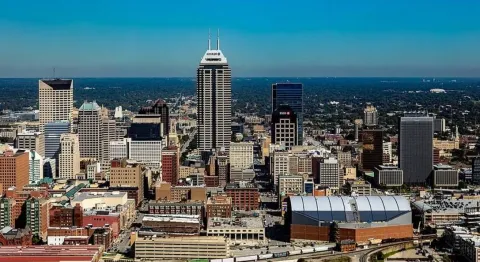
Retirement is a time to relax and enjoy the fruits of one's labor, and choosing the right place to settle down is crucial. Indiana offers a unique blend of affordability, quality of life, and cultural richness that appeals to many retirees. This article explores the key aspects of living in Indiana, focusing on overall quality of life, cost of living, crime and safety, access to quality healthcare, weather, and culture, with comparisons to the national average.
Indiana boasts a relatively high quality of life, characterized by a friendly community atmosphere and a slower pace of life compared to bustling metropolitan areas. The state's mix of urban and rural areas provides diverse living environments, from the vibrant city life of Indianapolis to the peaceful countryside. Indiana's quality of life is often highlighted by its low traffic congestion, ample recreational opportunities, and a strong sense of community. Compared to the national average, Indiana offers a more relaxed and stress-free environment, which is particularly appealing to retirees seeking tranquility.
One of the most attractive aspects of retiring in Indiana is its cost of living, which is notably lower than the national average. Housing costs are significantly more affordable, with median home prices well below the national median. Additionally, everyday expenses such as groceries, utilities, and transportation are also more budget-friendly. Indiana's low cost of living allows retirees to stretch their savings further, making it an ideal destination for those looking to maximize their retirement funds. The state's favorable tax policies, including no state tax on Social Security benefits, further enhance its affordability for retirees.
Safety is a critical concern for retirees, and Indiana offers a relatively secure environment. According to the latest data, Indiana's overall crime rates are close to the national average. While the state has a slightly higher rate of violent crime, it benefits from a lower rate of property crime. Smaller towns and rural areas generally experience lower crime rates, making them particularly appealing to retirees seeking peace of mind. It's essential for potential residents to research specific communities, as crime rates can vary significantly across the state.
Access to quality healthcare is a vital consideration for retirees, and Indiana offers a robust healthcare system. The state is home to several highly regarded hospitals and medical centers, particularly in Indianapolis, which has some of the top-ranked healthcare facilities in the Midwest. Compared to the national average, Indiana offers competitive healthcare quality with a wide range of specialists and medical services. However, rural areas may have more limited access to specialized care, so proximity to a larger city can be beneficial for those with specific medical needs.
Indiana's overall tax burden is relatively moderate compared to other U.S. states. The state features a flat income tax rate, which is lower than many states with progressive income tax systems. Property taxes in Indiana are also relatively low, which contributes to a favorable tax environment for homeowners. Additionally, Indiana has a state sales tax rate that is slightly above the national average, but it is offset by the absence of local sales taxes in most areas.
When compared to other states, Indiana's tax burden places it in the middle of the pack, making it more affordable than high-tax states like New York and California but less competitive than states with no income tax, such as Florida and Texas. Overall, Indiana provides a balanced tax environment that appeals to both businesses and residents looking for a stable and predictable tax structure.
Indiana's culture is a unique blend of Midwestern values and diverse influences. The state has a rich history and a strong tradition of arts and culture, with numerous museums, theaters, and cultural festivals. Indianapolis, in particular, is known for its vibrant cultural scene, including world-class museums and the famous Indianapolis Motor Speedway. Compared to the national average, Indiana offers a more traditional and family-oriented cultural experience, with a strong emphasis on community and local traditions.
Indiana experiences a four-season climate, with cold winters and warm summers. Winters can be snowy, with temperatures often dipping below freezing, while summers are generally mild to hot. The state's weather is comparable to the national average, but those who prefer milder climates year-round may find Indiana's seasonal fluctuations challenging. However, the distinct seasons offer beautiful autumn foliage and opportunities for winter activities, providing a rich variety of seasonal experiences.
Indiana presents an attractive option for retirees, offering a high quality of life, affordability, and a welcoming community. While the state has some variations in crime and healthcare access, its overall safety and healthcare quality are comparable to national standards. With its distinct seasons and rich cultural heritage, Indiana provides a fulfilling retirement experience for those seeking a balanced and comfortable lifestyle.




